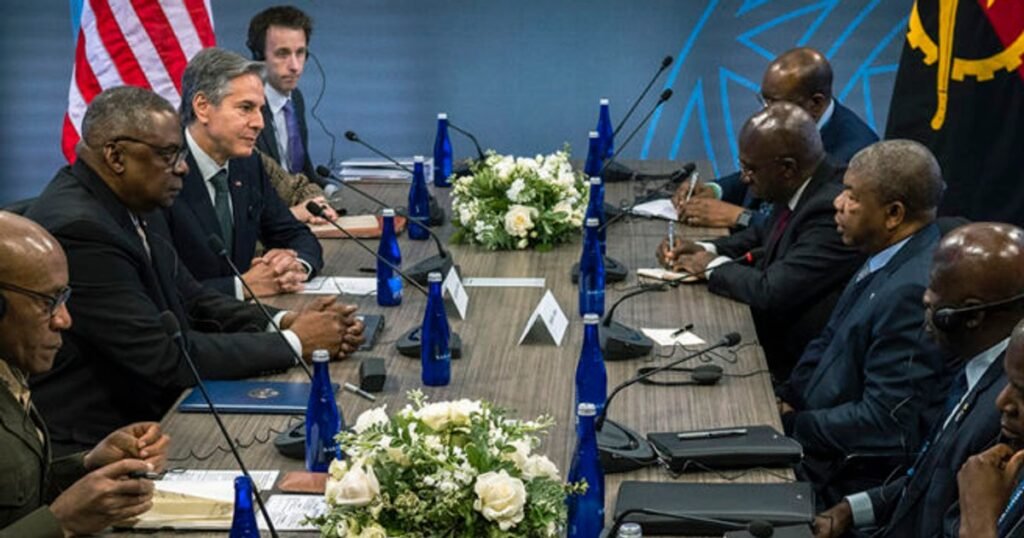The project, called the Lobito Corridor Project, is a rail infrastructure aimed at facilitating the movement of valuable minerals between Zambia, Angola, the Democratic Republic of the Congo (DRC) and Tanzania.
The 800km greenfield railway, a collaboration between the U.S. government, the European Union, the African Development Bank of Angola, and Zambia, was originally planned to run from the Benguela rail line in Luakano, Angola, to the existing Zambia rail line in Chingola. .
However, the railway will now run from the port of Lobito in Angola on Africa’s Atlantic coast to the city of Kolwezi in the Democratic Republic of the Congo and the port of Dar in Tanzania.
The section of the Lobito Corridor, which includes Tanzania, aims to extend the railway to the Indian Ocean coast and facilitate global and intra-African trade.
This section of the project is estimated to reduce emissions by approximately 300,000 tons per year, as well as provide an economic impact of $3 billion and 1,250 jobs across construction and operations.
For Zambia and the Democratic Republic of the Congo, this project will provide an alternative strategic route to international export markets.
This part of the corridor connects important mining areas, agricultural clusters and businesses in Zambia and the Democratic Republic of the Congo to the Port of Lobito, providing the fastest route for imports and exports.
It will also significantly ease the flow of cargo from the Copperbelt and Northwestern provinces to Western markets via Angola.
US vs. China in investing in Africa
Although the Lobito Corridor does not yet compare to China’s projects in Africa, especially the Belt and Road Initiative, it may prove to be very timely.
The Geo Political Monitor report claims that the Lobito Corridor, first announced at the EU Global Gateway Forum in October 2023, is a direct response to China’s Belt and Road Initiative (BRI).
It is also interesting to note that just one year after this project was launched, China announced that it would be renovating the decades-old railway between Tanzania and Zambia, with the aim of improving rail-sea transport in resource-rich East Africa. This means that we have entered into an agreement to do so.
Rebuilding the Tazara Railway will help landlocked Zambia, Africa’s second-largest copper producer, export the metal via Tanzania.
The agreement was signed by the presidents of the three countries during the China-Africa Cooperation Forum.
China’s FDI to Africa averaged over $4 billion from 2019 to 2021, while U.S. FDI has been decreasing year by year.
However, due to the post-pandemic economic downturn and reduced financing capacity, BRI-related investments in Africa collapsed, falling by 55% from $16.5 billion in 2021 to $7.5 billion in 2023.
Additionally, China’s lending to African governments and state-linked borrowers has plummeted throughout the pandemic, falling to less than $1 billion in 2022, according to Boston University’s Global Development Policy Center.
Chinese financial institutions approved $4.61 billion in loans to Africa last year, marking the first annual increase since 2016. From 2000 to 2023, China loaned a total of $182.28 billion to Africa.
However, in September 2024, Chinese President Xi Jinping announced at the China-Africa Cooperation Summit Forum in Beijing that China would step up its support to Africa, pledging nearly $51 billion in financing.
The Chinese president also called for building a “China-Africa network characterized by land and sea connectivity and coordinated development.” He encouraged Chinese contractors to return to the continent of 1 billion people after coronavirus restrictions that had previously halted some projects are lifted.
Recent developments in the Lobito Corridor project
The latest development on this project came in the form of technical assistance from the United States for environmental assessment studies.
The $2 million technical assistance grant was provided by the U.S. Trade and Development Agency during a ceremony on the sidelines of the United Nations General Assembly in New York City, attended by U.S. Secretary of State Antony Blinken.
The concession agreement was signed between the development entity, African Finance Corporation (AFC), Zambia, and Angola.
“The Lobito Corridor, connecting Angola, Zambia and the Democratic Republic of the Congo, is one of our biggest projects. The ultimate goal is infrastructure connecting the Atlantic and Indian Oceans,” Blinken said at the time.
“Today, for the first time, Tanzania is also participating in discussions on the Lobito Corridor, which we very much welcome,” the Secretary of State added, noting that the United States has so far committed $4 billion to the project. .

